Bikes and the pandemic: Major cities in Europe are not messing around when it comes to seizing the opportunity of the pandemic to reclaim more space for cycling. (I only wish cities like ours would be this smart.)
New eyes for the city: Don’t miss the latest guest on The War on Cars Podcast, NY Times columnist Jamelle Bouie. Like so many Americans, his life and perspective has been forever altered by riding an e-bike.
e-DIY: The Verge takes a close-up look at the DIY innovators who have long been at the forefront of the e-bike revolution.
Duh and wow: A study found that the air become much less toxic to humans who breathe when roads around schools were made carfree.
Race and the gas tax: Two Washington (state) advocates lay out a case that the gas tax is racist, regressive and should be thrown out and replaced with something different.
The future is lower-car: Note the comment by the CEO of BMW in this story where he says, “We’re preparing for the access that private vehicles have to these cities to be reduced.” Damn right you are!
Advertisement
Dangerous by Design: Latest report from Smart Growth America found that, “The number of people struck and killed by drivers nationwide while walking increased by an astonishing 45 percent over the last decade (2010-2019).”
Clean and Green: When Sam Adams was mayor he pushed for a street fee plan that was called Safe, Sound and Green. Now he’s back in City Hall working for Mayor Ted Wheeler and his first big job is to clean up all the trash in Portland and they’ve named the plan “Clean and Green”.
Design dangers: Ever considered that gridlock is the safest kind of traffic and the free-flowing and fast streets DOTs love to create are the type that kill the most people?
E-bike affordability plan: California advocates are pushing for legislation that would raise $10 million in subsidies to make e-bikes easier to purchase for low-income people.
Big trucks and the rise of ‘petro-masculinity’: The wonderful advocate and writer Angie Schmitt’s latest piece in Bloomberg dissects the melding of American machismo and a willing auto industry and finds out why trucks have become to dangerously bloated and so popular.
— Jonathan Maus: (503) 706-8804, @jonathan_maus on Twitter and jonathan@bikeportland.org
— Get our headlines delivered to your inbox.
— Support this independent community media outlet with a one-time contribution or monthly subscription.



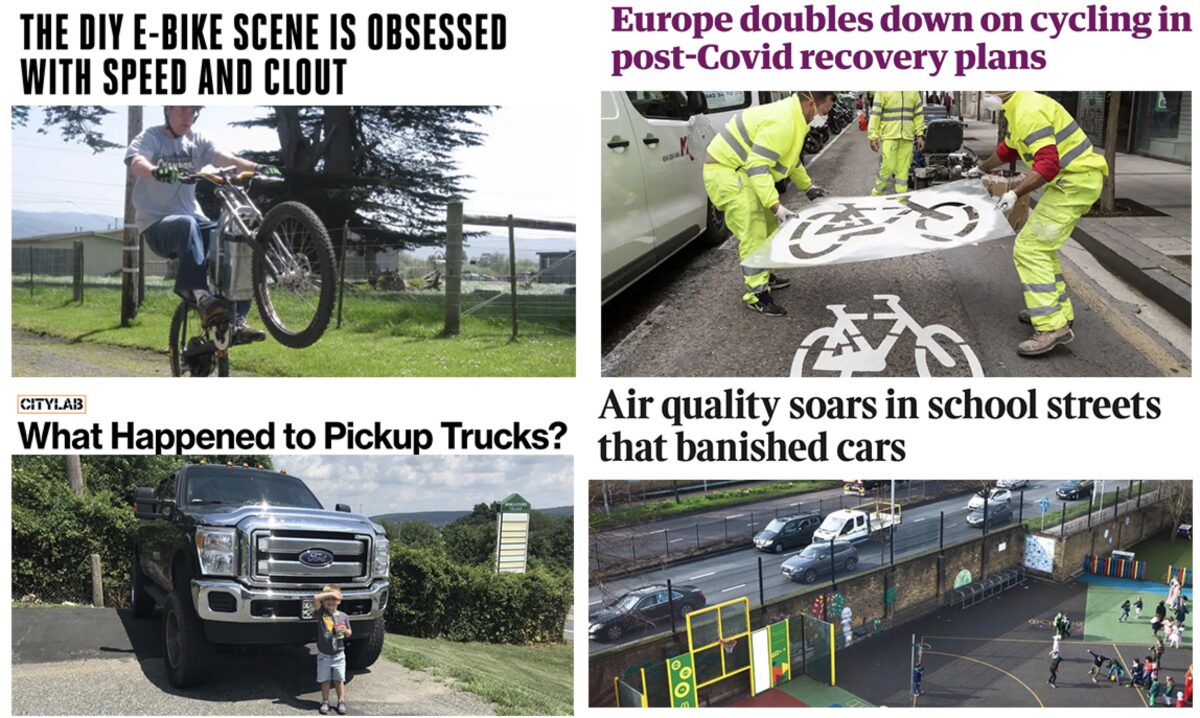
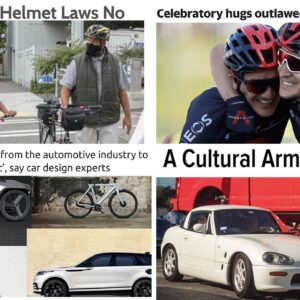
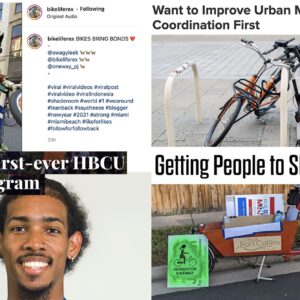
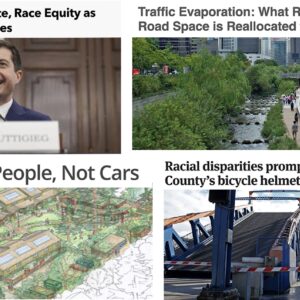
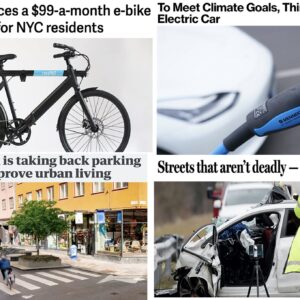
Thanks for reading.
BikePortland has served this community with independent community journalism since 2005. We rely on subscriptions from readers like you to survive. Your financial support is vital in keeping this valuable resource alive and well.
Please subscribe today to strengthen and expand our work.
In local road jurisdiction news: Washington and Multnomah Counties have transferred ownership of Cornelius Pass Road between HWY 26 and HWY 30 to ODOT, who are designating it a state Highway (HWY 126). https://www.koin.com/local/odot-to-take-cornelius-pass-ownership-effective-march-1/
This is an interesting reversal of trends…more typically its local jurisdictions seeking to take over control of state facilities vs. giving them up.
I wonder what this will do for 85th percentile speed trends, volume and pedestrian/ cyclist safety. It may be a deal with the devil: exchange smooth blacktop for poorer air quality, more traffic etc. [I might have to update my day time route to Hillsboro from Vancouver the next time I do it by car.]
My guess is that it will do absolutely nothing. I’d never even think of cycling or walking/running that road between Skyline and Highway 30 in its current state and I don’t anticipate that changing any time soon. No big loss though, with good nearby alternate routes like Old Cornelius Pass, Logie Trail, Newberry, and McNamee.
This is one of the few Hwy connections where it may benefit the metro area if ODOT actually expands it with a freight bridge across the Willamette North of the St. John’s bridge (allowing st john’s to be converted to local only). Freight traveling South and West from Vancouver has no other option than to travel through N. Portland. Columbia Blvd needs a road diet and diverters for local traffic only. The Western Bypass idea thankfully died, but expanding a freight connection around NW Portland would allow alternatives to I5. ODOT’s network design should make the system more robust, not focus on expanding capacity (eg RQ) where research indicates it will simply have an ephemeral effect on traffic, and ultimately poor overall effect on safety and pollution.
The article about gas tax feels incoherent to me. In one breath they argue that wealthy people can better afford electric cars and avoid gas taxes, but then later they have the alternative “carbon tax” on new vehicles. It is light on specifics but I would like to see those ripple effects thought through.
In theory it narrows the gap between gas and electric but it also makes used cars more valuable, i.e. expensive, and that value disappears if you resell the car in another state. High upfront costs and non-portable value are not typical planks in a social justice platform and neither are the complicated steps to mitigate them. I don’t know if that’s even possible in a state without income tax.
I agree that used vehicles should be assessed a fee (and as mentioned in the piece, this could be progressive). I also believe that the “economic transition assistance” in SB 5373 does, in fact, address social justice in a relatively conventional manner and could serve as a model in states that lack a tradition of progressive taxation:
“These new funding sources are being created with equity baked in. For example, the Washington Strong carbon tax proposal (SB 5373) dedicates 15 percent of revenue from the proposed tax to economic transition assistance for low-income households and workers”
(I’d prefer that the revenue percentage to be higher.)
Given that OR does have an income tax, a progressive tax should be the preferred alternative to a gas tax for those who support a just transition. A progressive income tax was once proposed for transportation funding in Portland but was abandoned by Novick due to the faintest whiff of disapproval from the BPA. The Street Trust (BTA), BikeLoudPDX, Oregon Walks, this blog, and the leadership of “No More Freeways” also overtly or tacitly supported this sharply regressive gas tax even though the progressive income tax polled better.
I’m with you on making OR’s income tax more progressive. It’s effectively very near flat; even if it was intended to be progressive originally, it (like the minimum wage, and like – hey! – gas taxes!) has not been indexed to inflation and hasn’t kept up.
In talking about taxes in Oregon it’s worth noting that Portland is now the highest income tax combined city/county/state in the country for people with income above $250k. Oregon is flat, but the city county recently enacted taxes are not. The preschool for all and funding for homeless services measures are intended to be redistributive of income.
It’s a common misperception that progressive taxes are better for the poor. They are not.
https://www.google.com/amp/s/www.vox.com/platform/amp/2014/10/8/6946565/progressive-taxes-are-not-the-solution-to-inequality
A carbon tax is just another energy tax. Seems to me the effect isn’t that much different. Maybe the narrowing-the-gap argument is from an added tax on electricity based on its generation source? Maybe, but even a coal-powered EV would incur less tax than a gas-powered Prius because EVs simply use a lot less energy to begin with, even when it is coal-generated. Six of one, half a dozen of the other, in the bigger scheme of using a substantially increased gas/energy tax to discourage the current planet-destroying levels of consumption.
Of course a carbon tax has a clear benefit for the auto-industrial complex: it will take many years to implement, especially if it is done on a piecemeal, state-by-state basis, whereas gas taxes have existing mechanisms at both the state and federal levels, and can be increased tomorrow.
The gas tax is one of the most regressive taxes in Oregon/Portland which means that it also disproportionately impacts black, indigenous, and marginalized people. Support for gas taxes along with support for crony-capitalist market urbanism are examples of the white neoliberal consensus in active transportation spaces.
It’s easy to get carried away with this idea that any regressive tax is a bad tax. People won’t really be interested in good governance if it’s not their money being spent. Good for everyone to have some “skin in the game”.
PS: Doubtful this will get though the censor Jonathan’s delete button. 🙂
I don’t understand this “regressive tax” idea at all. Seems to me that the gas tax is the closest thing we have to a true user-fee, which seems about as fair as it can get: pay for the amount of the resource (roads) you use – simple as that. In fact, the gas tax is even fairer b/c if you choose to drive a gas guzzler (truck, SUV, etc), you pay more relative to others. This is what’s wrong with the way Oregon (and other states) are approaching the road-user fee: e-vehicles, hybrids, and other efficient vehicles pay the same per-mile fee as gas guzzlers, which provides absolutely the wrong incentive.
Any flat fee is going to hit low income folks harder than high income folks. Affluent Portlanders can afford to live close in and make the choice to drive or not, therefore limiting their exposure to the tax. Low income Portlanders who live on the edges of the Metro where our affluent overlords have neglected to build road infrastructure such as sidewalks, bike lanes, or useful public transportation don’t have the choice, they have to drive. That means low income Portlanders are more obligated to pay the tax and the resulting tax bill is a higher portion of their income than affluent Portlanders.
Secondly, not everyone has a choice on what they drive. I can choose to bike, or I could choose to buy a Prius, Tesla, or F-250 because I can afford all of those options. Low income folks frequently have no choice in what they drive. They drive what they can afford. Even if they opt for an older, fuel efficient car, they are still going to get less MPG than if they could afford a newer, more efficient vehicle. Sometimes the “choice” of what you drive is dictated by external forces you can’t control.
Older vehicles are NOT, by and large, less fuel efficient! I wish folks would stop repeating this trope. The early nineties was a good period for fuel economy. Much of what has come along since isn’t great at all. And Priuses, since those were mentioned, have now also been around for, what, 25 years?!
And this gas tax we are all whining about is so paltry. Now if we had a gas tax like the Norwegians maybe we’d have something to talk about but our tiddlywinks gas tax is hardly worth mentioning.
Interesting concept that gridlock actually might be safer for non-motorized street users, and this Cubed article seems to argue that. The reason I’m skeptical is what we see in gridlocked environments such as New York City. A tragically high toll on peds and cyclists there, despite often being in a state of gridlock. My experience in gridlock is seeing desperate and impulsive driving by motorists gone buggy with frustration. This behavior has been fatal to many in streets where drivers are screaming and pounding their steering wheels looking for momentary escape routes and acting without due caution. So provocative idea this article, but color me skeptical. Of course it’s true that a stopped vehicle is unlikely to hit someone (!) but it’s when they start moving…
There are much more dangerous cities to be a pedestrian than NYC. The article is correct, slower average speed caused by traffic congestion is safer than building high capacity, high speed streets.
https://archive.nytimes.com/www.nytimes.com/interactive/2011/08/12/us/most-dangerous-cities-for-walking.html?_r=1
https://smartgrowthamerica.org/dangerous-by-design/
I’m skeptical too. Gridlock is only safer if cyclists and pedestrians still have safe ways to move around the gridlocked cars. All too often, stalled traffic blocks crosswalks and bike lanes (especially near right-turn zones), which forces non-car-users to go outside the crosswalks and bike lanes to use them. And that makes things more dangerous.
You have to look at deaths per capita. NYC might seem dangerous, just looking at pure numbers of injuries and deaths. The reality is that places with wide/fast arterials are significantly more dangerous. This is why we see more pedestrian deaths in outer east Portland. There are more pedestrians downtown, but the lights keep drivers down to safer speeds.
Sheesh, the truck article is ripe with hyperbole. Lazy. I’d rather read articles based on empirical statements, such as, “contemporary truck design trends are dictating design elements that limit driver line-of-site, ignoring safety protocols.” I get that the author is attempting to connect design elements to socio-political purchasing trends, but its distracting to see the relentless pattern of personifying the vehicle throughout this article.
Angie Schmitt is a national expert on pedestrian-safe street design as well as active transportation. Her perspectives are well-researched, hardly lazy or hyperbolic. I’m glad to see national reporting that connects the trends in politics and culture.
The article does have lots of “empirical statements”–how much truck weights have increased, the high percentage that are extended cabs now vs. earlier, the cost increases…
The personification stuff (“furious”, “angry”…) seems appropriate because so many truck buyers are buying trucks for an image they don’t get from cars. They’re not hauling or going off-road, they’re driving to work or the store. So the image is relevant, and the terms the author uses to describe it seem apt.
Obviously the rich white folks who control the legislature have a vested interest in keeping the gas tax as regressive and highway-oriented as possible. As with red-lining, the only way you are going to end it is through the courts, not through the legislature.
? Obviously? This comment is so fraught with prejudice generalizations and knee-jerk assumptions that the validity of the summary that the courts not the legislature will be the change agent is undermined.
Ah yes, those dastardly wypipo are rubbing their hands together with sick glee at the prospect a gas tax. No other reason they could possibly support it. Clearly because they’re white we should assume they have the absolute worst possible intentions at all times, and that they have secret ulterior motives because they just hate BIPoC for… some reason… and that a gas tax is just as harmful as redlining to that end.
Stuff “progressive” wypipo like:
Owning a Tesla/Prius, living in a 2000+ sq foot house, gardens watered with city water, eating organic grass-fed beef, jetting away to vacations, and wagging their effete, bougie fingers at the gas-burning clunkers used by poor people for essential trips.
Design Dangers: I find it odd that during last spring and summer, as everything was being shut down, that the feds had no issues in effectively banning all commercial airline passenger flights nationwide (and all from overseas), and our state governors effectively banned intercity travel and non-necessary car travel, even Amtrak service was reduced – but here we are, record pedestrian deaths, sky-high murder rates, record VMT, and our same federal and state governments have gone from bold to shy within 3 months. Our cities, states, and feds clearly have the power to ban traffic if they want to, at any time, constitutional or not, for heath & safety reasons. But how does Fauci react? He drives, in fact he really has no choice, as the CDC is only accessible by car. And so there’s no health crises, just lots of “accidents.”
I agree with you. America is an expensive place to live in, and the cost of EVERYTHING is racist. It sucks that poor people, who are disproportionately minority, so often must drive when it is so expensive. The solution is to provide better alternatives to driving, and maybe to compensate members of minorities for the cost, not to continue to subsidize driving with cheap gas.
I think the more equitable solution is to divide all of the wealth up equally.
Not thrilled with the power obsession in e-bike land. I don’t agree with those that say all e-bikes are motorcycles, and not bikes anymore … but too many of them are headed that direction. There actually aren’t that many sub-500W bikes or conversion kits anymore. A 1000W bike, capable of 28 (or more) mph on flat ground, arguably is a moped and belongs in the car lanes, at least on lower-speed city streets.
Sounds a lot like what is happening with giant pickup trucks…
Yeah, and now we have Ford working on how to top the T.Rex. Ridiculous arms race. I understand performance, but at some point you’ve gone beyond what should ever be put in the type of vehicle in question.
And of course it isn’t just horsepower, but “looking” tough, with trucks. That high hood and vertical grille are part of the macho image, but that’s all they’re for: they actually create more room under the hood than actually needed. Compare a midsized pickup (Ridgeline, Tacoma, Ranger, the new Frontier) with a midsized automobile from the same manufacturer with the same size V6 engine, and the car has a much lower hood (even relative to its lower ground clearance) and much smaller snout. And of course it makes the trucks vastly more dangerous to those not in them.
A lot of macho trucks aren’t actually about performance (unless you count rolling coal as performance). It’s all a show. Many of those guys just want a pumped up truck that looks mean, sounds mean, and looms over all those Kias and other sensible vehicles.
It’s hardly unique to trucks; doesn’t Surly market towards that same macho image?
Surly makes fat bikes for snow and sand, etc. Don’t see very many on the road.
They also make touring bikes, road bikes cargo bikes, etc. Maybe check out their lineup some time, it’s no more “macho” than Specialized, Giant, Kona, etc.
No.
But yeah, e-bikes, like mopeds, really should have medical liability insurance coverage.
LOL, nice picture in that article of the original Rad power bike. Of course it was rockin’ a Cycle Analyst. You can use that thing to make any conversion kit to have a 500W limit or another parameter limit of your choosing, like speed, current, etc. It might not get as many clicks, but the DIY scene also routinely achieves “just the right amount” of power through the endlessly customizable build options offered by traditional bicycles and the simple sets of components that electrify them.
You’re assuming that he’s being serious. I’d be careful with that assumption.
Hi Jonathan,
Any plans on a review of how Portland’s “safe streets” pandemic-response program is going?
Thanks.
Yes. On my list. A bit behind right now but will get to it ASAP.
Any bike with a 7000w motor on it is an electric motorcycle, NOT an eBike. For the love of all good things, please do not use the term eBike when referring to an electric motorcycle!!!
The real issue for the high power DIY crowd is what happens when the crash in some offroad location and their non-engineered battery ignites… Should the entire e-mountain bike industry collapse because a home brewed battery caused a forrest fire?
eBikes and off road eMotorcycles on trails demand a level of engineering that is similar to or better than that of cell phones. The risk is simply too great not to.
Should the entire e-mountain bike industry collapse when a battery in an over-the-counter e-mtb causes a forest fire? It will happen. They are not immune to product defects. And the design pressures towards better aesthetics, higher performance, and lower cost can willfully increase those risks. Lithium batteries are simply dangerous, no way around that.
True, a battery fire will happen, even with name brand eBikes. The probability is much greater – and will happen more often – with batteries that do not have the engineering, testing & quality control of a name brand eBike.
I think the Bayesian outcome will be different. Even if it were true that name branded ebike batteries have ‘better’ engineering, testing & quality control (which I don’t agree with — it’s an easy place to cut cost, e.g., by using cheaper cells), I think you’ll find more forests burned down by name branded ebikes simply because they have and will continue to rapidly outpace the population of DIY setups.
To be shipped by air or water, Li-Ion batteries require a UN 38.3 certification (there is an exception, to ship via Special Provision 310, but that method of shipping is insanely laborious and expensive)
UN 38.3 tests for stresses related to shipping, not intended usage.
CE examines blueprints to verify conformance to intended usage.
UL examines blueprints and conducts physical tests to verify the actual product can be used safely as intended.
I have added electric systems to literally hundreds of bikes – in fact I am do so today. I have yet to see a conversion kit eBike battery with a CE or UL rating. (12 years working with eBikes). I have yet to see a brand name eBike Battery without one.
Large brands are hypersensitive to risk. I haven’t seen any name brand bike manufacturer skimp on their batteries.
i think i hit the sweet spot of 3000-4000w on my converted full suspension enduro. i can ride 30+mph with pedal assist (never in bike lanes) and 40+ on throttle (equiv to a tuned 2 stroke moped). my battery is in my backpack (protected). my moped insurance was $10/month and i would be happy to pay that (and more).